Ukrainian organized crime and "oblivion" in Google

Ukrainian organized crime and "oblivion" in Google
What do pedophiles, financial fraudsters, criminal "authorities," and corrupt Ukrainian politicians have in common?
This is a desire to erase public information about their dark deeds.
A Global Scam
Since 2019, some owners of Ukrainian internet publications began noticing something strange: they increasingly received notifications from the Google search engine about copyright violations. In letters from the search engine, it was stated that the alleged author of a publication reported that the publication violated the American "Digital Millennium Copyright Act" (DMCA), supposedly claiming that you illegally published someone else’s article and therefore we will remove the link to it from the search results. And removal from the world’s largest search engine’s catalog of the link to the publication is equivalent to removing the text from the internet altogether.
What was happening felt surreal because often complaints were made against articles written by editorial staff members and sometimes by the publishers themselves. It was obvious that the "happy letters" were scribbled by impostors.
The key to explaining this anomaly lay on the surface. Specifically, in who the articles were about, the copyrights of which had allegedly been violated. They were the subjects of large corruption scandals, officials and politicians connected to organized crime, public figures who appeared in an unflattering light in the eyes of society. In other words, it was about clearing Google search results of "skeletons in the closet." Moreover, it is being done in an entirely fraudulent way. (The author deliberately uses the present tense because nothing is yet completed).
Fraud with the DMCA, of course, is not a purely Ukrainian phenomenon.
A year ago, in May 2020, the American publication The Wall Street Journal (WSJ) published its study dedicated to this issue. According to it, in 2019 Google removed nearly 80% of 240 million links in its search catalog that were marked as copyright violations (by comparison, in eight years, from 2002 to 2010, only 100,000 links were contested in the search engine’s catalog). Now, about a million complaints are made daily to the search giant under the DMCA.
Traditionally, the lion’s share of copyright infringement complaints comes from anti-piracy companies - they submit requests to delete hundreds of millions of URL addresses leading to pages with illegally copied movies, audio tracks, computer games, and software each year. Most of them are legitimate complaints submitted on behalf of real rights holders.
How many complaints do fraudsters submit to remove compromising information about their clients from search results? Researchers from WSJ write that they “discovered hundreds of instances where individuals or companies, often using clearly fictitious people, forced ... to remove links to unfavorable articles and blog posts suggesting that convicted criminals, foreign officials, and businessmen had committed misdemeanors in the US and abroad.”
The author of this article selectively studied the history of complaints filed under the DMCA with a dozen Ukrainian internet publications (such as "Ukrainska Pravda," Censor.NET, "Obozrevatel," "Apostrophe," "ORD," CRiME, and others) over the last year and a half. I found more than 2,000 clearly fraudulent complaints about alleged copyright violations, affecting tens of thousands of links to pages with sensitive information.
WSJ in its article especially highlights a group of requests from Ukraine, where fraudsters demanded the removal from Google search of "unfavorable content about members of the Ukrainian parliament, alleged mafia members, and other government officials and businessmen." The American colleagues do not mention the names of the final "beneficiaries" of the fake complaints, only hinting at them.
For example, the article hints at an Odesa businessman "allegedly associated with organized crime," and two Mykolaiv figures with "political ties who allegedly profited from financial corruption."
In turn, I, selectively processing the obtained data, compiled a list of over 50 politicians, businessmen, law enforcement officers, and obvious criminal elements for whose benefit impostors tried to clear Google search results. To keep this text from becoming as voluminous as the novel "War and Peace," we’ll stop at those who deserve special attention.
People Wall Street Journal Left Unmentioned
According to WSJ, an artist from Northglenn, Colorado, named Jamie Judson was unaware her old LiveJournal account had been taken over by someone writing in Russian "as part of an apparent maneuver to delete" compromising content.
In the 2000s, she used her LiveJournal online diary to write about Japanese comics until she abandoned it long before Russian-language posts about a businessman allegedly connected to organized crime in the Ukrainian city of Odesa began appearing on her pages a few years ago. WSJ authors assume the texts were borrowed from materials first published on other websites in 2017.
In 2019, a person named Oleksandr Lisnyi requested Google remove search links to texts on these sites, citing the posts on Ms. Judson’s LiveJournal page as the original source (he actually used several accounts on the blogging platform in his scheme. - author’s note).
WSJ decided not to mention which specific story the wrongdoers attempted to remove from the search using the hacked account of the Colorado artist. But we found in the Lumendatabase base requests to Google for removing search links submitted on behalf of Oleksandr Lisnyi. We analyzed the "Lisnyi" requests (for example, this one and this one) and found out that the "ears trick" was performed for the sake of a major "authoritative" entrepreneur from Odesa named Volodymyr Halanternyk.

Volodymyr Halanternyk (center)
As far as is known, Halanternyk was associated in the 90s with the grouping of Oleksandr Anhert, nicknamed Angel. His report, published by the Italian police on a drug and arms smuggling case in 1998, included Hennadiy Trukhanov, the current mayor of Odesa.
The fraudulent requests documented by WSJ to "clean up" Google search results for Halanternyk are just the tip of the iceberg. Our research showed that "fake" complaints under the DMCA systematically arrive for links with texts that, besides Halanternyk, also mention: Odesa mayor Hennadiy Trukhanov, criminal "authority" Oleksandr Anhert (nickname Angel), a figure from the "Russian mafia" of the early 90s Leonid Minin, a businessman with a controversial reputation Oleksandr Zhukov, and LLC "Euroterminal”—a monopoly on servicing vehicles at the Odesa sea port.
Back in 2013, journalists from the "Slidstvo.Info” project found that the "Euroterminal" company got exclusive rights to "customs clearance" of imports in Odesa region by personal decision of then-president Viktor Yanukovych.
As Ukrainska Pravda, referencing investigative journalists, wrote, the president of the company—a Russian named Pavlo Lisitsyn—"is closely linked to Leonid Minin, Oleksandr Anhert, and Oleksandr Zhukov, who were accused of illegal arms supplies from Ukraine to Croatia during the war in former Yugoslavia.”
Moreover, according to journalists, "another person with a specific biography is in the business partners circle of the CEO of ‘Euroterminal’"—Oleksandr Anhert—a citizen of Israel who "was convicted for murder and helped organize lucrative oil product trading through Odesa port.”
The authors of the material also found a document stating Anhert "is part of an international criminal gang, with former Odesa resident Leonid Minin named as the head of this gang.”
Investigative authors also highlighted how someone was putting extraordinary efforts to ensure these "skeletons in the closet" were not exposed. " Someone is very keen to make sure that the dark past does not interfere with such a wonderful present," journalists emphasized.
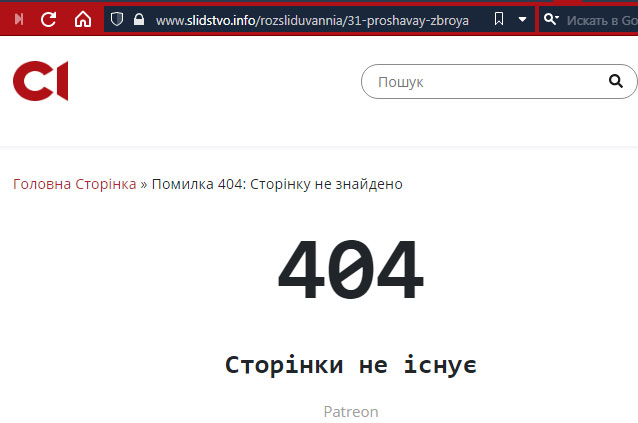
We will add that this concern is so strong that the original investigation disappeared from its authors’ website. Moreover, some mysterious someone periodically sends Google "fake" complaints about alleged copyright violations to demand removal of mentions of the "Euroterminal" end beneficiaries on other sites from search results. According to our research, Ukrainska Pravda, Censor.NET, "Obozrevatel," "ORD," CRiME, and about a dozen other information resources were targeted.
Let’s continue.
The Wall Street Journal authors hinted at two more Ukrainian seekers of "erasure" in Google— some Mykolaiv businessmen with political ties. Americans didn’t name the names here either, but "detecting" them is also not hard work.
Vladyslav Chayka is the brother-in-law of Parliament Speaker Dmytro Razumkov, the son of the late long-serving mayor of Mykolaiv, Volodymyr Chayka. Oleksiy Pelipas is a friend and business partner of Chayka Junior and, according to Mykolaiv investigative journalists, the "brain center" of corruption schemes involving city real estate and land. Pelipas, judging by criminal chronicles, is part of the gang led by Mykhailo Titov, a formidable criminal "authority" nicknamed "Multyk"; Vladyslav Chayka also has joint ventures with him. 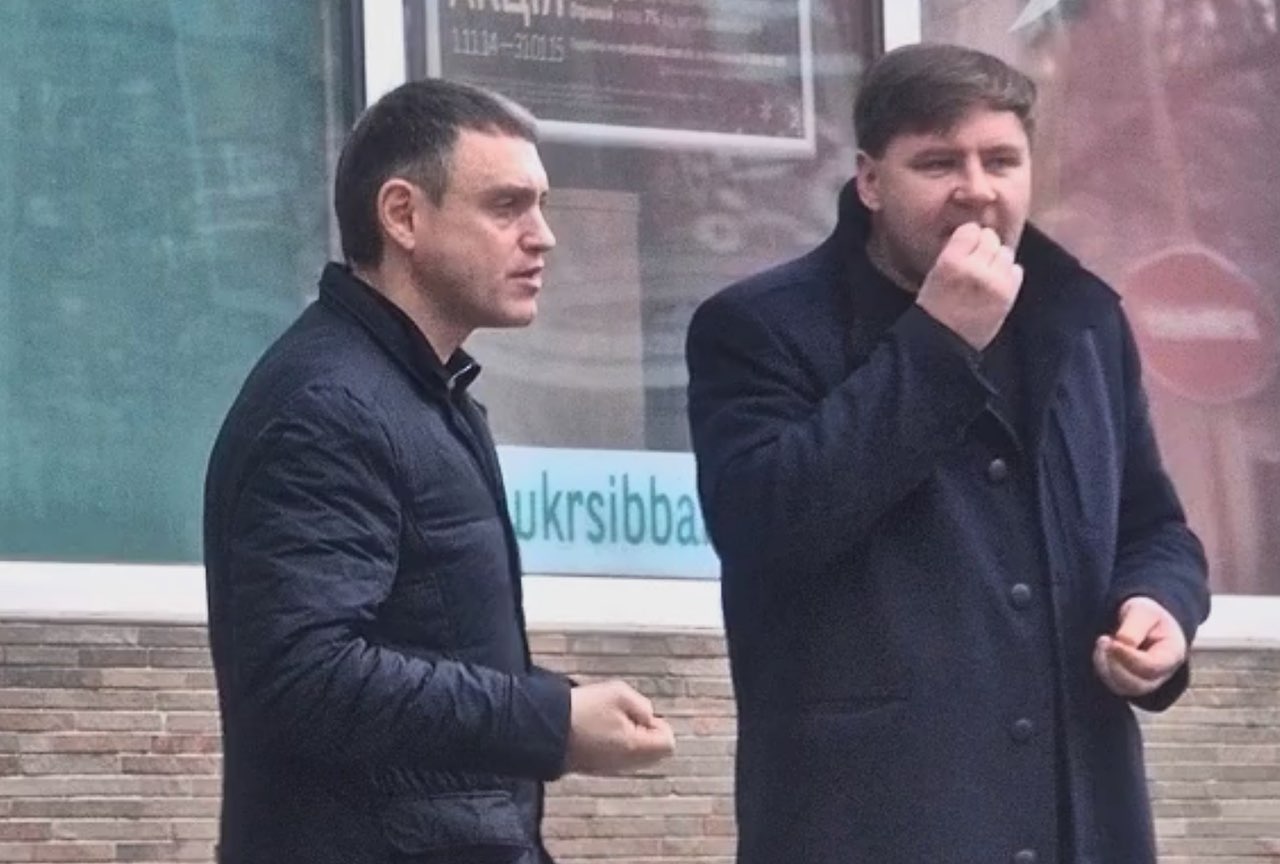
Oleksiy Pelipas and Vladyslav Chayka, early years of "cooperation."
In 2019, in the interests of Pelipas and Chayka, an attempt was made to clean from search results a series of articles from the Mykolaiv Journalistic Investigations Center, a branch of the American non-profit organization, Global Investigative Journalism Network. As "Nikcenter” later wrote, the removal requests indicated the investigation materials were allegedly copies of posts in the "LiveJournal” by "Vechirniy Mykolaiv” newspaper editor Ihor Danylov. As it turned out, this was a fake account in the name of Mykolaiv journalist—real Danylov stated he did not create these posts and did not send removal requests for the Center’s publications.
A year later, in 2020, some "well-wishers" through "fake" complaints tried thrice to remove from Google search results the note on CRiME about Oleksiy Pelipas being arrested and an article about the political ambitions of Razumkov’s brother-in-law, prepared by the CRiME project specifically for "ORD.” In one of the instances, the complainant signed as "Andrew Karpinski." Almost the same as the editor of that article and the author of these lines.
The American Burden of Serhiy Tihipko, Pavlo Fuks, Shariy’s Sponsors, and a Pedophile
While preparing this material, the author tried to systemize the beneficiaries of the "cleansing" by groups, for example, "politicians," "businessmen," "officials," and "criminal elements." But encountered a problem: too often in our case politicians and officials are simultaneously businessmen and criminal elements. And vice versa. 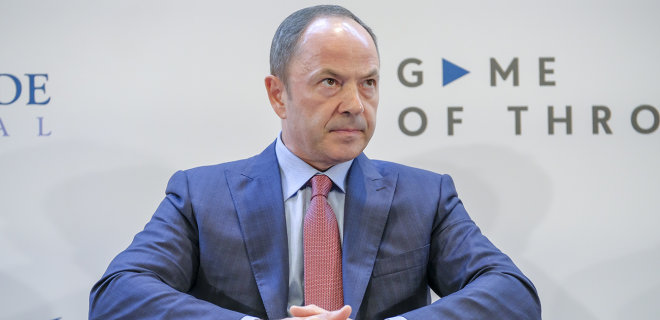
Serhiy Tihipko
Take, for example, multimillionaire Serhiy Tihipko. A prominent banker, former minister, and member of parliament, a bold politician who once dared to challenge Viktor Yanukovych (but quickly "backed down"). Since the middle of last year, claims have started appearing in the Lumendatabase database demanding Google remove several hundred links allegedly due to copyright infringement (for example). The texts requiring removal from search by impostors mostly connected the two names — Serhiy Tihipko and Paul Manafort.
Donald Trump’s political strategist, Manafort, was convicted in the U.S. for Russian interference in American elections. Before the Revolution of Dignity, he advised Ukrainian politicians from the Party of Regions with great benefit to himself. Among Manafort’s clients was Serhiy Tihipko. Presumably, six months ago, Serhiy Tihipko became extremely uncomfortable with mentions of his name in the context of Trump’s convicted associate.
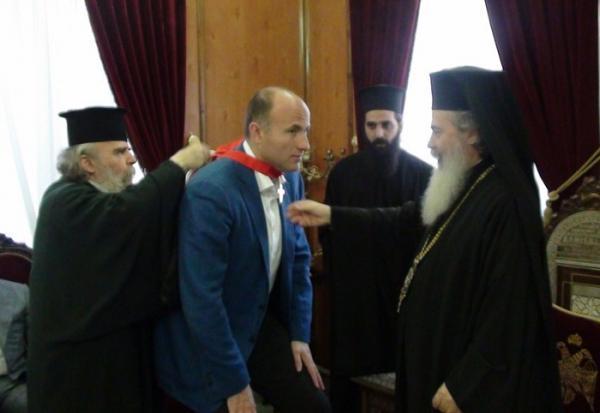
Pavlo Fuks (in the center)
Months earlier, in April 2020, complaints started reaching Google about articles featuring oligarch Pavlo Fuks, who is currently trying to gag the "Obozrevatel" site of Mykhailo Brodskyi through the courts. Some well-wishers "claimed" copyright on articles both about Fuks’s accumulation of initial capital and his current affairs. Notably, the "complaints" were filed on behalf of this oligarch by a character who until recently pretended to be Kateryna Kaplyuk, an investigative journalist and advisor to the head of the National Agency on Corruption Prevention.
This same impostor was spotted in attempts to "cleanse" search results of mentions of Concorde Capital investment company founder Ihor Mazepa in a negative context. "Kateryna Kaplyuk" has also repeatedly tried to remove texts from search results about Pavlo Fuks’s acquisition of energy assets linked to Yanukovych’s circle and his joint gas business with the family initially behind the "Boyko’s rigs" scandal.
A year before "Poberezhanskyi", in the fall of 2019, someone who identified themselves as Yehor Barskyi filed a series of complaints about alleged copyright infringement. Here is an example of one of his claims:
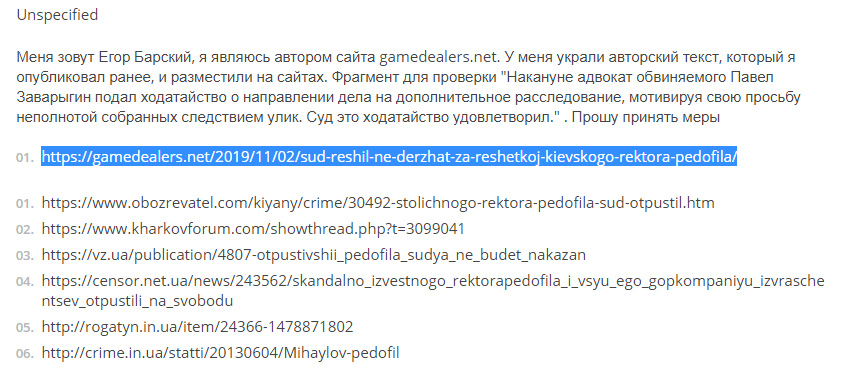
As can be seen from the link given by Barskyi as the "original source," the "original" article appeared on his site around the time he started bombarding Google with complaints about alleged copyright infringement. However, the content he tried to cleanse from the search index appeared six years earlier, in 2013. I remember because I wrote about this topic myself.
The matter concerns the "adventures" of the former rector of the Academy of Water Transport Vasyl Mykhaylov.

Vasyl Mykhaylov
In the distant 2009, when the "Orange" were in power, Mykhaylov and several of his accomplices were "taken" by the GUBOZ during a major operation against pornographers-pedophiles. Despite extensive evidence, a pile of physical evidence, and numerous victim testimonies, the "Mykhaylov case" was sent back for further investigation twice, until in 2013, on the eve of the Revolution of Dignity, it was finally swept under the rug. Vasyl Mykhaylov walked free.
Eight years ago, when the scandal was still fresh, it was said that strong connections in power helped the porn director survive in prison and ultimately evade punishment. But names were not mentioned. However, thanks to the fake complaints by "Barskyi," we found the link to the prehistory of "pedogate", and now we can assume that Vasyl Mykhaylov was connected to the top of the once ruling Party of Regions through Anton Pryhodskyi, and it was thanks to these connections that he evaded punishment.
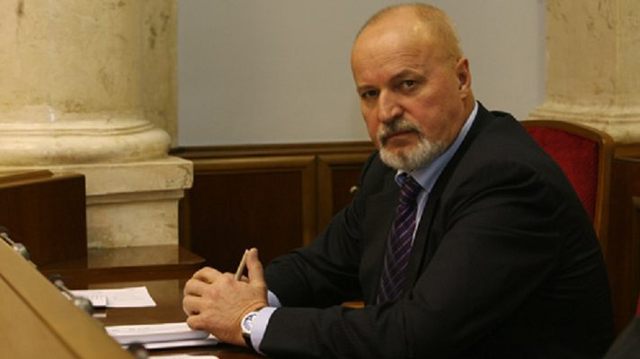
Anton Pryhodskyi
Anton Pryhodskyi, judging by media reports, still oversees the Yanukovych family’s real estate that ended up in annexed Crimea.
Criminal Cases and Tarnished Epaulets
For several months now, Google administrators have been receiving daily demands to remove links to materials where Pavlo Barbul, the former director of the state company “Spetstekhnoexport” (part of the “Ukroboronprom” corporation), is mentioned negatively. The Lumendatabase already contains hundreds of requests to remove URLs of content mentioning the ex-head of a state structure specializing in arms trade.
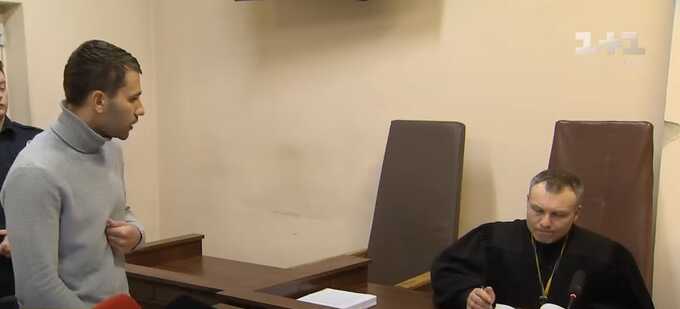
Pavlo Barbul (left) at a court hearing in his criminal case
Pavlo Barbul is a defendant in criminal proceeding No. 52017000000000889, which was conducted by the National Anti-Corruption Bureau (the case went to court in January).
As reported by “Slovo i Dilo”, NABU detectives established that in 2009, with the initiative of “Spetstekhnoexport” leadership, the state enterprise concluded an agreement with a foreign company Global Marketing SPLTD to accompany one of the foreign economic contracts. Under this contract, “Spetstekhnoexport” was to supply military products manufactured by the state enterprise “Plant 410 CA” for the Ministry of Defence of India (Air Force Headquarters). The mediation of the non-resident was supposed to ensure the conclusion and further execution of the foreign economic contract, for which “Spetstekhnoexport” paid $2.22 million. However, NABU detectives determined that Global Marketing SPLTD did not provide the declared services, although “Spetstekhnoexport” and the foreign firm signed work completion certificates. Based on these certificates, “Spetstekhnoexport” transferred $2.2 million to the account of Global Marketing SPLTD at Noor Islamic Bank in the UAE. Thus, the state enterprise was harmed by the specified amount. (More about this and other criminal episodes can be read, for example, here).
During the pre-trial investigation of this episode, Pavlo Barbul almost faced another criminal case. According to information from a decision by the High Anti-Corruption Court dated December 29, 2019, NABU detectives claimed Barbul attempted to unlawfully influence the pre-trial investigation process of the “Spetstekhnoexport” case, including by offering undue benefits. Moreover, he allegedly paid certain media representatives for coverage “including with the aim of unjustified public discreditation” of NABU, in particular detectives investigating the case.”
Apparently, considering “trolling” fake copyright complaints insufficiently effective, the criminal defendant Pavlo Barbul is trying to “clean” the internet of his criminal trail with the help of the National Police. Since December 4 of last year, the Pechersk Department of the National Police Directorate in Kyiv has been investigating criminal proceedings No. 12020100060003326, based on Pavlo Barbul’s report of an alleged crime against him under Part 2 of Article 182 of the Criminal Code. The applicant accused over two dozen journalists and internet publication owners of violating his right to privacy, causing significant harm to legally protected rights. Barbul claimed that the media committed a crime by allegedly illegally collecting, storing, using, and disseminating confidential information about Barbul without Barbul’s consent.
Colleague of the National Police Headquarters Dmytro But is not so strict, and journalists writing about him are not subject to criminal cases. Fake copyright complaints submitted to Google in his interests (such complaints only from the name of “Nastya Makarova” were filed about 500 times) are complemented by attempts to fill the search results with "positive" content.
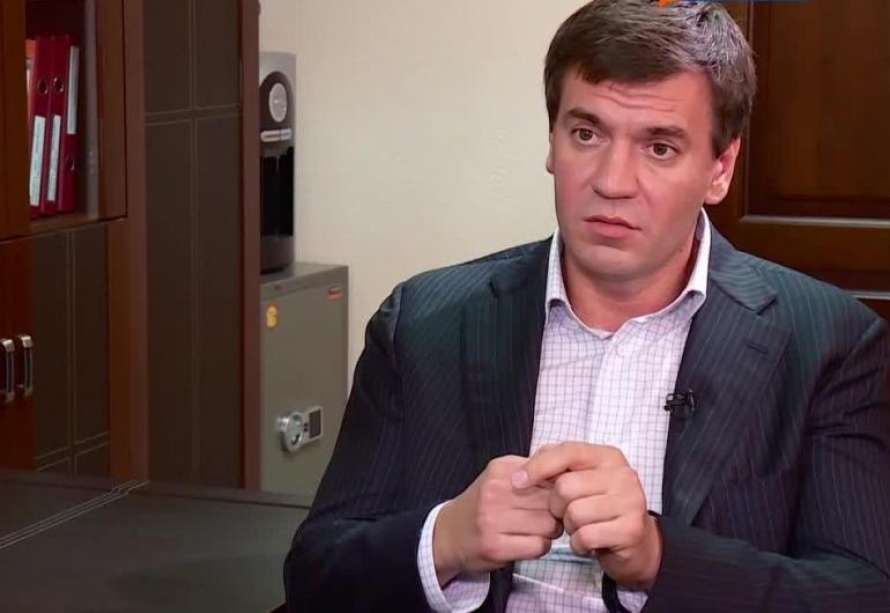
Dmytro But
The "positive" content unfortunately has a noticeable tone of comicality: in one article, the high-ranking investigator acts as an expert on guard dogs, in another on smartwatches, in the third he discusses the pros and cons of food delivery services. These publications are placed in addition to attempts to cleanse Google’s search catalog of links to materials about why But’s lifestyle does not match his income (here is an example of a complaint), about the cost of his daughter’s education in England (complaint), about a criminal case, where Dmytro But figured definitely not as an investigator (example complaint).
Among other law enforcement officers in whose interests fraudsters "clean" Google, the following can be noted.
Prosecutor Mykola Ulmer. A year ago, impostors "claimed" copyright on publications about investigations of possible illicit enrichment of Ulmer and demanded their removal from search results.
Prosecutor Oleksandr Kharlov. His well-wishers attempted to delete publications about his possible involvement in a theft from a Kiev jewelry store Graff involving 2.5 million euros in jewelry and foreign currency.
Prosecutor of Rozdilna local prosecutor’s office in Odesa region Andriy Shandarak was recently acquitted of bribery charges by the court. An article about this wanted to be "torn down" from search indexes via a fake DMCA claim by "Halyna Karpovych". Notably, the history of claims by this character in Lumendatabase shows that "Karpovych" repeatedly tried to do something similar in the interests of the aforementioned Trukhanov - Halanternyk - Minin - Anhert group and others.
Google’s reports on complaints filed under DMCA against Ukrainian internet publications are, in themselves, a depository of compromising materials. Here you can make many astonishing discoveries and encounter "amazing creatures.".
There are endless tales to tell about figures in both social and criminal chronicles seeking «oblivion» in Google’s search results. But we need to gradually move towards the conclusion.
Modus operandi
Researchers from The Wall Street Journal a year ago found quite a few «firms claiming they can remove negative content from popular search engines, including Google». However, let’s clarify: they clearly searched in the English-speaking segment of the internet. Similar offerings are not present in the Ukrainian and Russian-speaking segments. Services for removing links to negative content from search results are not openly advertised here.
The only character who at least indirectly admitted that someone in his interest is removing links to compromising material from Google’s search with fake copyright infringement complaints is the scandalous Kyiv developer Andriy Vavrysh, who is now under investigation.
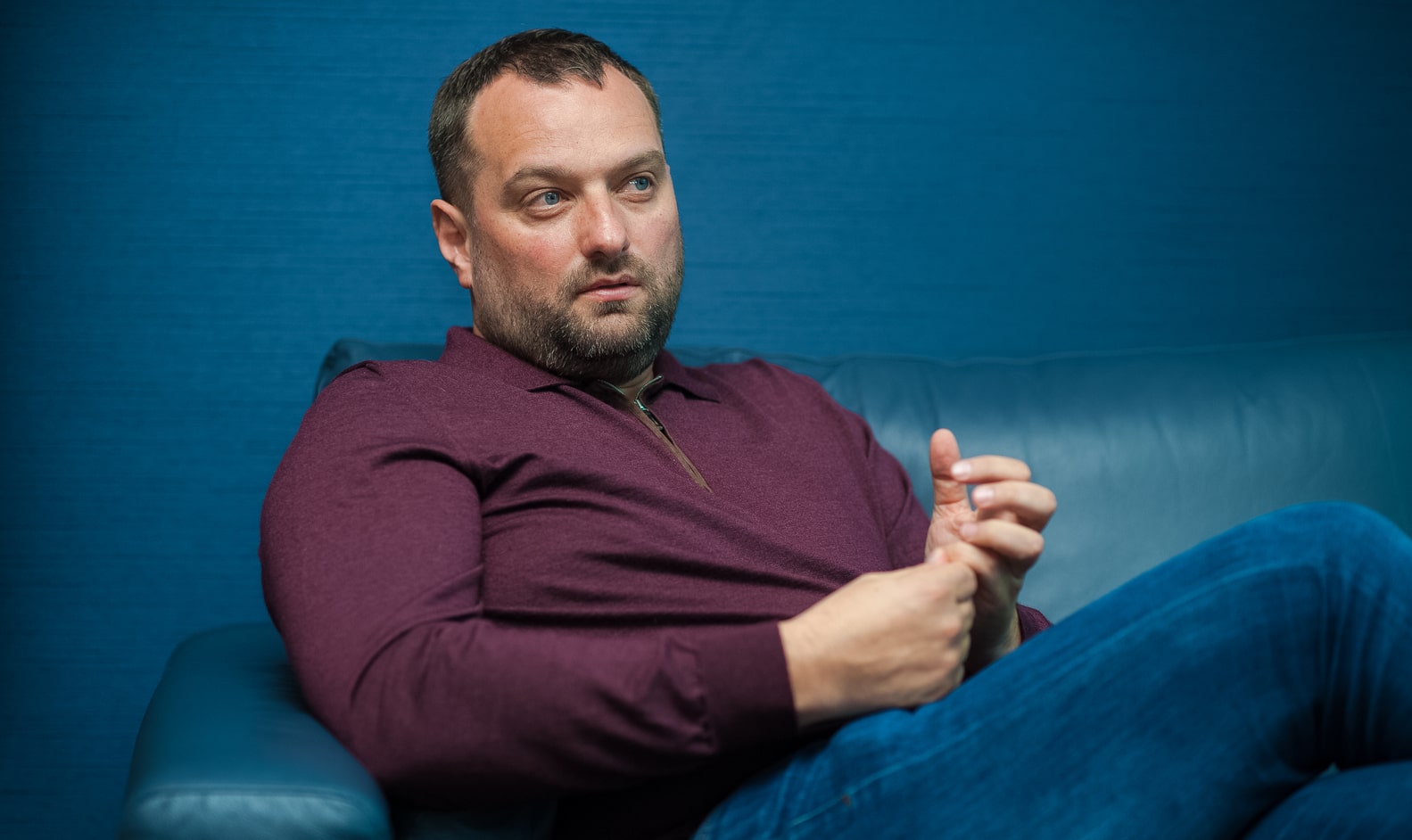
Andriy Vavrysh
After Vavrysh’s «subordinates» demanded that Google remove links to unfavorable materials on behalf of the online publication theBabel, the construction magnate explained in comments to the site’s editorial office that, allegedly, these are activists-volunteers helping him cleanse the internet from filth.
These same «activists» attempted to remove from search a note about alleged fraud by Vavrysh in real estate, attempted to cleanse links to material about possible embezzlement of the General Prosecutor’s Office land plot. They also attempted to remove from Google’s search catalog links to our article about intrigues in the State Architectural and Construction Inspectorate, prepared especially for «ORD».
Obviously, these and other «activists», acting in the interests of those mentioned (and not mentioned) in our article, do not send messages to Google selflessly.
WSJ authors, having thoroughly studied the information about senders of fake complaints to Google, identified key signs of fraud:
- clearly fictitious names of senders (often resembling the nicknames of teenage gamers – author’s note);
- photos supposedly of senders on avatars – copied from the internet portraits of random people;
- blogs attributing authorship contain suspiciously few entries;
- false claims about connections to legitimate publications of real authors.
The author of these lines, in turn, found that self-proclaimed individuals most often cite seemingly randomly selected external resources that copied the original text as the primary source, without being too concerned about the fact that the name of the copyright infringer does not match the name even in the copy they cite as the primary source in the complaint.
However, there are cases when fraudsters create a site «from scratch» where they accumulate copies of the content the order was placed for, and then cite it as the primary source.
This is also punishable
Copyright protection specialists claim that until the beginning of 2020, Google satisfied complaints filed under the DMCA almost without further questions. This concerned both legitimate complaints and requests filed by fraudsters seeking to «clean» search results in the interests of compromised subjects. Entirely legitimate URLs could be «kicked out» of search results in batches if site administrators, who became targets of DMCA-attacks by impostors, did not react timely and adequately to warnings from Google administrators.
Last year, in response to complaints of copyright infringement, the search giant’s administration began asking more frequently for proof that the complainant actually owns the copyright. From the second half of 2020, the initial «package of documents» was no longer sufficient – Google started asking copyright holders additional questions. According to our interlocutors, now authors and their legitimate representatives have to exert a bit more effort for the search engine to satisfy their complaints. As for fraudsters-cleaners, circumventing the established «filters» is now virtually impossible.
During our research, we recorded attempts by impostors to present fabricated «on the knee» legal documents and even forged court decisions to Google. But all of them were futile. A false copyright infringement complaint now has less than a one in a hundred chance of being satisfied.
Below – graphs showing the results of complaints about alleged copyright infringement by the «Ukrainska Pravda» and «ORD» online publications, compiled from Google statistics.
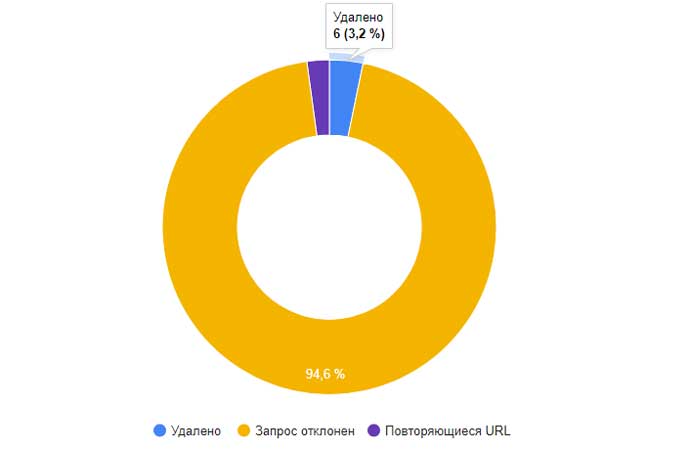
Data on complaints about «Ukrainska Pravda»
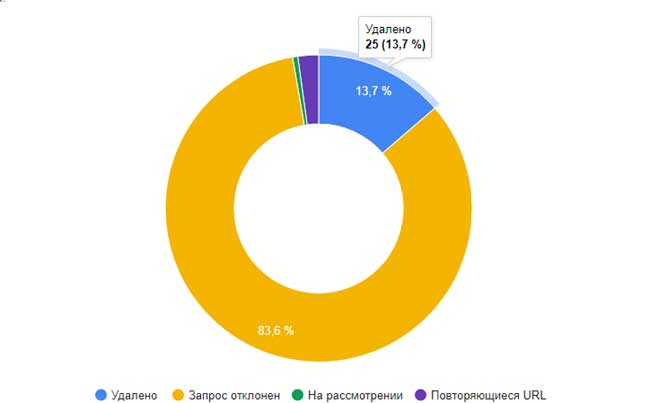
Data on complaints about «ORD»
Statistics show that Google removed 3.2% and 13.7% of disputed links for the two publications, respectively, from the search catalog. However, the infographic does not account for the fact that almost all removed links were disputed before 2020 – that is, before the strict filtering of claims filed under DMCA came into effect. Now «complaints» from miscreants do not pass, except in extremely rare cases.
An account that submits several complaints and fails to convince Google of the legitimacy of its claims receives a «fraud» label, and subsequent claims it submits are rejected automatically.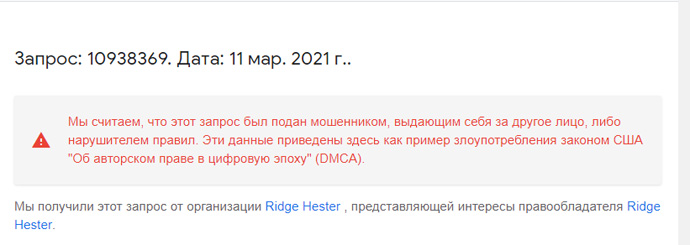
So, Google now nips fraudulent claims in the bud, ensuring links to articles impostors attempt to «clean» stay in the search catalog where they belong. However, according to the author’s observations, this doesn’t seem to decrease fake copyright infringement complaints, but rather the opposite. What’s going on here?
Clearly, it’s about money.
The fact that it’s practically impossible to trick Google with a fake complaint doesn’t mean it’s impossible altogether – there’s always a slender chance, albeit an illusory one, that success could come not from the hundredth but perhaps the thousandth attempt. But the main thing is, an entry like «Google cleaning» (or something similar) still looks solid in the price list. And a considerable portion of the budget allocated by the client for improving their information space reputation can be attributed to it.
But here all participants in the venture tread on slippery ground. Offering to remove URLs from Google for a fee has signs of an offense under part 1 or part 2 of article 190 of the Criminal Code (fraud). Since the citizens offering such an «option» neither have the rights nor the ability to fulfill the promise.
If one opens a scientific-practical commentary to article 190 of the CC and reads it carefully, one sees another legal trap. In context, not just the client’s money becomes the object of nefarious encroachment, but also the copyrights of genuine copyright holders, publications of which fraudsters attempt to «remove» from the search engine with fraudulent claims.
I haven’t heard of any precedents where the media tried to hold impostors accountable with the help of the police. Moreover, to do so would require considerable resources with illusory chances of success. For understandable reasons, managers who send fake complaints to Google use «fake» email addresses and fictional identities. Finding the perpetrator, linking them to the beneficiary, proving malicious intent, and formalizing it process-wise – a non-trivial task.
However, most beneficiaries of the search engine «cleaning», as you understood from the above, are already under «investigations». Searches and seizures have been conducted. Among the evidence collected, investigators may well find evidence of copyright fraud. And here it depends on the «operational necessity» of the investigative bodies, whether to expand a criminal case with another chapter or not.
Another «trouble» lies in the intricate rights and interests of the authorities of the country where the search engine itself is a resident.
When filling out Google’s notification form about copyright infringement, you must swear under penalty of perjury that your statement is true.
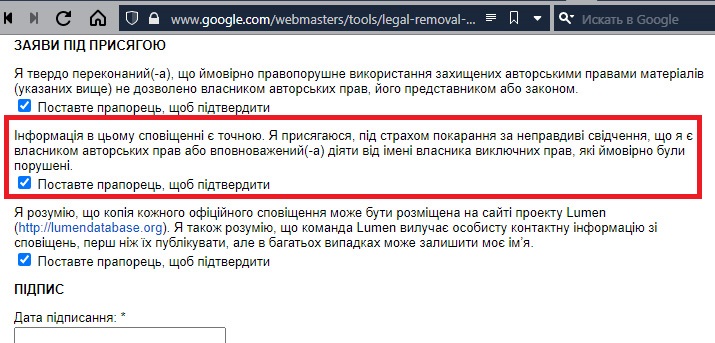
Such a requirement might seem like a mere formality to most residents of our latitudes, but it’s not the case. A notification of copyright infringement, even in electronic form, isn’t a greeting card. It’s a document that carries certain legal implications. Accordingly, if you knowingly lie in it, there’s a chance your actions could fall under a relevant article in the thick volumes of American law.
Also, using U.S. laws to manipulate search engine results so that Ukrainian figures suspected of criminal offenses can remove stories of their deeds from the information space is unlikely to elicit sympathy from the local authorities or the public.
Andriy Karpinskyi, chief editor of the project CRiME, specially for «ORD»
Topics: Oleksandr LisnyiVadym KazartsevAndriy VavryshVadym ShandarakOleksandr KharlovMykola UlmerDmytro ButPavlo BarbulAnton PryhodskyiVasyl MykhaylovIhor MazepaPaul ManafortPavlo FuksAnatoliy ShariySerhiy TihipkoOleksiy PelipasLeonid MininMykhailo TitovVladyslav ChaykaPavlo LisitsynEuroterminal LLCOleksandr ZhukovOleksandr AnhertVolodymyr HalanternykWall Street JournalGoogleSchemesFraudCopyrightDMCA

Comments:
comments powered by DisqusЗагрузка...
Our polls
Show Poll results
Show all polls on the website











